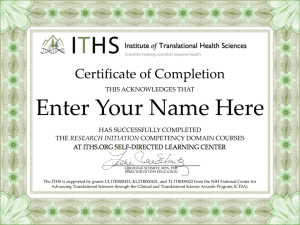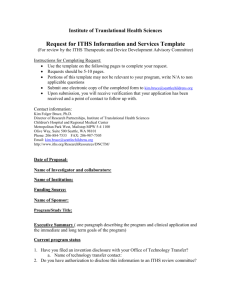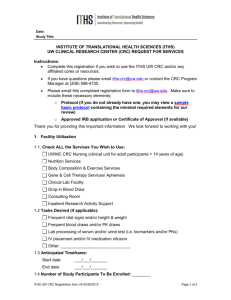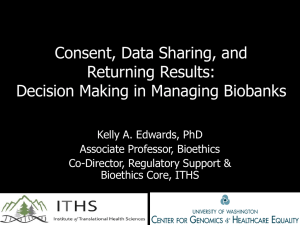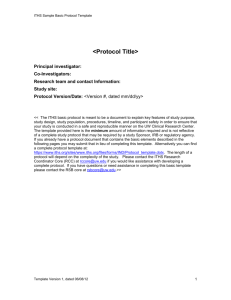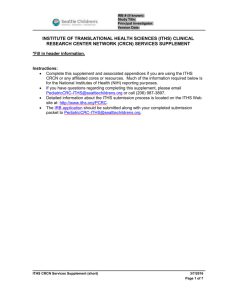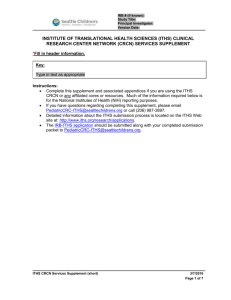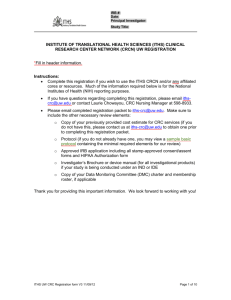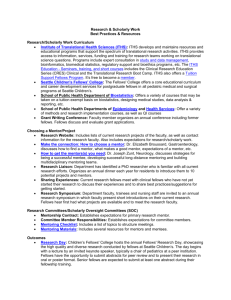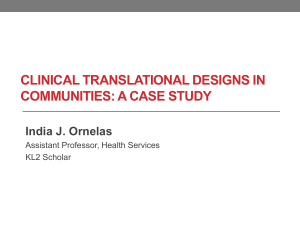Instructions: Please tailor this template to your project and be
advertisement
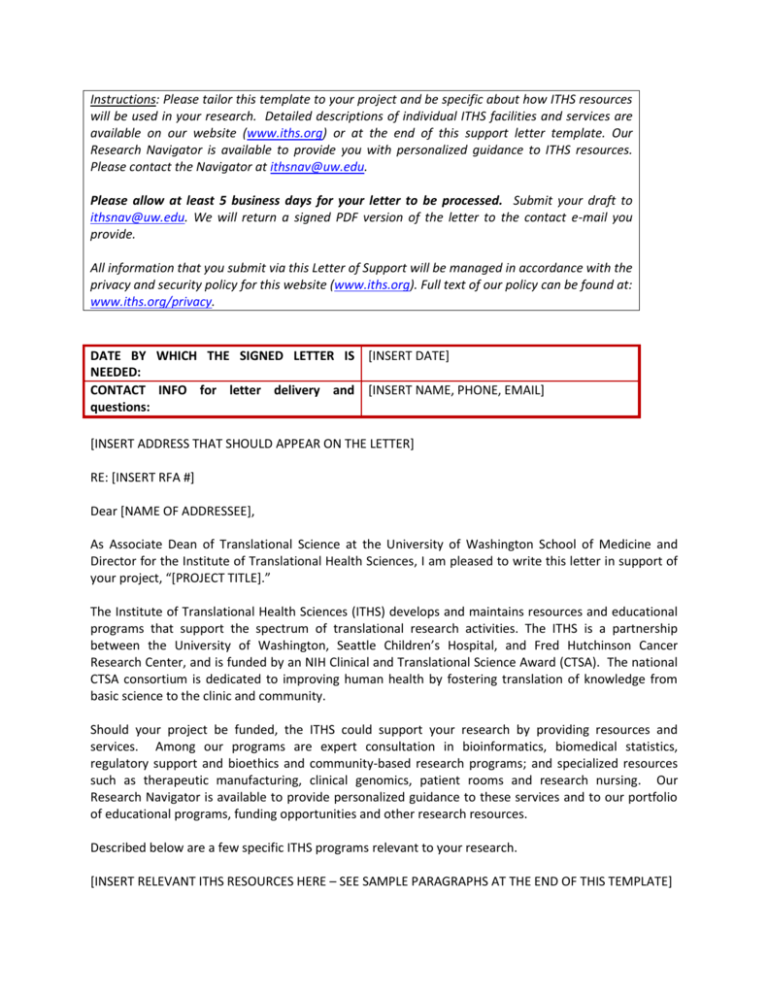
Instructions: Please tailor this template to your project and be specific about how ITHS resources will be used in your research. Detailed descriptions of individual ITHS facilities and services are available on our website (www.iths.org) or at the end of this support letter template. Our Research Navigator is available to provide you with personalized guidance to ITHS resources. Please contact the Navigator at ithsnav@uw.edu. Please allow at least 5 business days for your letter to be processed. Submit your draft to ithsnav@uw.edu. We will return a signed PDF version of the letter to the contact e-mail you provide. All information that you submit via this Letter of Support will be managed in accordance with the privacy and security policy for this website (www.iths.org). Full text of our policy can be found at: www.iths.org/privacy. DATE BY WHICH THE SIGNED LETTER IS [INSERT DATE] NEEDED: CONTACT INFO for letter delivery and [INSERT NAME, PHONE, EMAIL] questions: [INSERT ADDRESS THAT SHOULD APPEAR ON THE LETTER] RE: [INSERT RFA #] Dear [NAME OF ADDRESSEE], As Associate Dean of Translational Science at the University of Washington School of Medicine and Director for the Institute of Translational Health Sciences, I am pleased to write this letter in support of your project, “[PROJECT TITLE].” The Institute of Translational Health Sciences (ITHS) develops and maintains resources and educational programs that support the spectrum of translational research activities. The ITHS is a partnership between the University of Washington, Seattle Children’s Hospital, and Fred Hutchinson Cancer Research Center, and is funded by an NIH Clinical and Translational Science Award (CTSA). The national CTSA consortium is dedicated to improving human health by fostering translation of knowledge from basic science to the clinic and community. Should your project be funded, the ITHS could support your research by providing resources and services. Among our programs are expert consultation in bioinformatics, biomedical statistics, regulatory support and bioethics and community-based research programs; and specialized resources such as therapeutic manufacturing, clinical genomics, patient rooms and research nursing. Our Research Navigator is available to provide personalized guidance to these services and to our portfolio of educational programs, funding opportunities and other research resources. Described below are a few specific ITHS programs relevant to your research. [INSERT RELEVANT ITHS RESOURCES HERE – SEE SAMPLE PARAGRAPHS AT THE END OF THIS TEMPLATE] Access to some ITHS services requires approval by the Human Subjects Review Committee and the ITHS Center for Scientific Review in addition to a unit specific resource allocation evaluation, at which time you will be provided with a cost estimate. Other services may be available at a cost which may be partially subsidized. All resource estimations are based upon availability, review and final approval from ITHS administration. We wish you success with your application and look forward to a fruitful collaboration. Sincerely, Mary L. (Nora) Disis, MD, FACP Associate Dean, Translational Science, University of Washington School of Medicine Professor, Medicine Member, Fred Hutchinson Cancer Research Center Director, Institute of Translational Health Sciences DESCRIPTIONS OF SPECIFIC ITHS RESOURCES Outlined below are some specific ITHS programs that are available to support your research. To ensure a strong and specific letter, please only select resources applicable to your project and insert them into the letter above. We encourage you to add a sentence or two about the relevance of the resource to your proposed work, and to contact our Navigator at ITHSNav@uw.edu if you have any questions. Clinical Resources Programs Clinical Research Centers: The CRCs offer inpatient and outpatient nursing support for a wide variety of therapeutic trials and clinical studies. The nursing staff is also able to collect and process blood or other samples in the CRCs and provide short-term specimen storage and shipping of specimens to other facilities or centralized banks. . The therapeutic manufacturing labs help develop gene and cell based clinical products for therapeutic applications that is compliant with current Good Manufacturing Practices (cGMP). Finally, the Bionutrition and Body Composition group offers expertise and specialized facilities for feeding studies, diet-intake analysis, exercise studies and DXAs. Regulatory Support and Bioethics: This group offers guidance and education in completing IRB and other regulatory applications, developing or implementing data safety monitoring plans and developing study related documents. It also offers bioethics consultations to address ethical concerns in research. A pool of study coordinators is available as well. Preclinical Support: The Preclinical Research and Development Network supports novel technologies and methodologies through the early phases of development by consulting with basic researchers seeking to develop their inventions for clinical testing. This group also advises on the content and format of Investigational New Drug (IND) and Investigation Device Exemption (IDE) applications. Tools and Technology Programs Statistical Services: Statistical support from the ITHS is coordinated through the Center for Biomedical Statistics (CBS). The CBS provides guidance regarding design and analysis options for study proposals for Phase 1 through Phase 3 trials, and has experience in both animal research and clinical trials. The CBS also provides expertise in conjunction with Biomedical Informatics to ensure timely and thorough data collection, and quality assurance review. Biomedical Informatics: The goal of the BMI is to facilitate sharing of data across all ITHS sites and core functions. BMI assists with access to electronic health information across partner institutions. We are also able to provide development of specific data capture forms, tools to facilitate clinicians’ access to existing databases, and scalable approaches for interfacing to biological study data from multiple sources that contribute to a patient’s chart. Community Engagement and Regional Collaborations Program Community Engagement: The ITHS is establishing collaborative pathways for community-based research with communities that are diverse by race, ethnicity, culture, rural and urban locations, geography, health status and health service delivery. These efforts are a partnership among the Group Health Center for Health Studies, the UW SOM’s successful 5-state medical education program in the WWAMI region (Washington, Wyoming, Alaska, Montana and Idaho), and several American Indian/Alaska Native tribes. Education Program Please contact the ITHS Navigator to discuss the Educational Programs offered by the ITHS.
